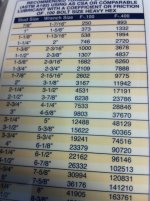Big Wave D
Platinum Member
- Joined
- May 13, 2010
- Messages
- 531
- Tractor
- Kubota L35, Kubota B6200E
I have never had a wheel come of because of lugs nuts loosening up. I always use a crossing pattern when tightening them. I also do this with my 1/2" impact, but I don't use the highest of the 3 settings. I start with the lowest, 1. Then when it won't tighten any more, I go up to setting 2. I don't however, just let it hammer away until it stops turning. Instead, I watch the socket for a small amount of what I'd call "final seating" torque. My wife could take the lug nuts off if she needed to. I have helped many a person on the side of the road, usually women, that I don't think would have a prayer of being able to change their flat tire. The lug nuts seem like they were tightened to the max torque that the impact could generate and had Red Loc-Tite (sarcasm) applied to boot.
I also judge what I think will hold on a fastener by the size of the fastener. Small bolts, I am using 1/4" sockets or smaller wrenches. Medium gets 3/8"s sized sockets, and the larger get 1/2" or 3/4" depending on how large they are.
I also judge what I think will hold on a fastener by the size of the fastener. Small bolts, I am using 1/4" sockets or smaller wrenches. Medium gets 3/8"s sized sockets, and the larger get 1/2" or 3/4" depending on how large they are.

